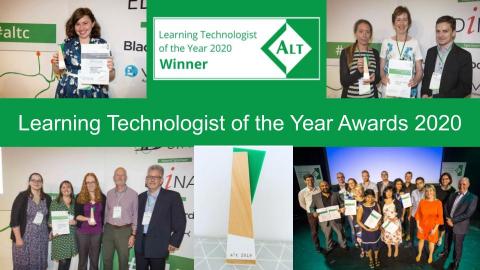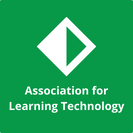
The Learning Technologist of the Year Awards are still open for entries, with the closing date in just one week, on 30 April 2020. The Awards celebrate and reward excellent research and practice and outstanding achievement in Learning Technology. Established in 2007, the Awards have established a benchmark for outstanding achievement in Learning Technology on a national scale and attract competitive entries from the UK and internationally. All entries are reviewed by an independent judging panel chaired by the President of ALT. Entries for the Awards close on 25 March 2020.
The following categories will be awarded:
-
Learning Technologist of the Year (individual)
-
Learning Technologist of the Year (team)
-
Learning Technology Research Project of the Year
Community Choice Award
All short-listed entries will be asked to supply a short video (with subtitles, no longer than 3 minutes) and supporting information for the public vote deciding the Community Choice Award. If you are looking for inspiration, have a look at the entries from last year's finalists.
Award Ceremony
The Awards will be presented at the Gala Dinner of the ALT Annual Conference on Thursday 10 September 2020 at Imperial College, London, UK. The judging panel will make the following awards: First, second and third prize as follows: 1st prize £1000; 2nd prize £500; 3rd prize £250. The Community Choice, voted for openly, is also awarded at the Gala Dinner. Finalists (up to two for teams) will be invited to attend the ALT Conference Gala Dinner to receive their Awards.
How to enter
The awards are free to enter and are open to individuals and teams based anywhere in the world. If you'd like to see what it takes to win, read this insightful blog post from Lizze Seymour.
Entry form
You need to complete all sections of the appropriate online entry form. Entries will be judged on the basis of the information you provide and the evidence you refer to. We acknowledge all entries via email. The closing date for entries is Wednesday, 25 March 2020 for all categories:
-
Entry Form A: Learning Technologist of the Year (individual or teams)
-
Entry Form B: Learning Technology Research Project of the Year
Short-list
The judging panel reviews all entries and the highest scoring entries in each category are short-listed.
Interviews for short-listed entries
All short-listed entries will be invited for an interview, either in person or online. Interview dates are provisionally 5/6 May 2020 in Milton Keynes. Interviews will be 25 min long, and you will be asked to give a 10 min presentation followed by questions from the judging panel.
Finalists
Following the interviews all short-listed entries will be notified and Finalists invited to the Award Ceremony. Finalists will be asked to supply a short video (under 3 minutes with subtitles) and supporting information for the public vote deciding the Community Choice Award. The public vote takes place in August.
Judging criteria
Entries are judged (from the completed entry form, and, if short-listed, at interview) in answer to the following criteria and questions:
| Learning Technologist of the Year |
Learning Technology Research Project of the Year |
The judging criteria are informed by the CMALT principles. We include these here for information: |
|---|---|---|
|
What makes your work THIS YEAR an outstanding achievement in Learning Technology? ('this year' refers to the 12 months prior to submitting your entry) |
What makes this research project THIS YEAR an outstanding achievement in Learning Technology? ('this year' refers to the 12 months prior to submitting your entry) |
|
| What makes your/your team's work excellent? | What makes this research project excellent? | A commitment to exploring and understanding the interplay between technology and learning |
| How did you develop and support this achievement? | A clear, credible statement of what methodological approach was taken and which, if any, ethical implications were considered | A commitment to keep up to date with new technologies |
| Strong evidence that your work has made a significant impact on practices within the your or your team's organisation, community, or sphere of influence | Strong evidence that the project made a significant contribution to Learning Technology, including evidence of its impact | A commitment to communicate and disseminate effective practice |
| Clear explanation of how others may learn from your work and what have you done to enable others to do so |
Clear explanation of how others may learn from this research project and what have you done to enable others to do so |
An empathy with and willingness to learn from colleagues from different backgrounds and specialism |
